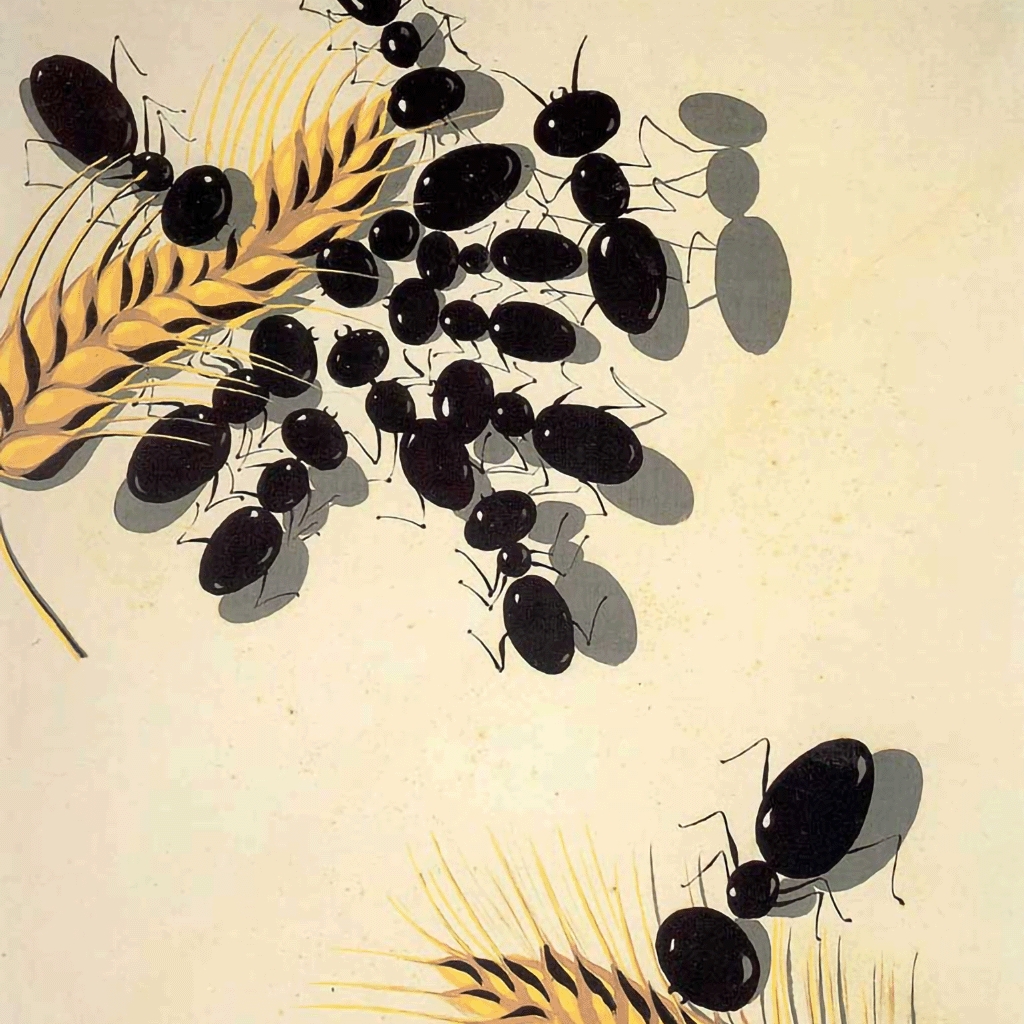The Literary Labour of Ants
Refabulation, Digression, and Utopian Form in Daniel Sada’s Porque parece mentira la verdad nunca se sabe (1999)
DOI:
https://doi.org/10.52537/humanimalia.19122Keywords:
ants, mexican literature, Daniel Sada, zoopoiesis, fables, animal fables, utopian formAbstract
This essay considers the literary labour carried out by ants in Daniel Sada’s Porque parece mentira la verdad nunca se sabe (1999), considered one of the most significant works of Mexican literature in the last decade of the twentieth century. This essay takes a digressive scene within the novel, in which an ant fable is imagined, as a model of “refabulation”, a rewriting of Western formic, or ant-centred, narratives that attempts to escape the total enclosure of allegory. Sada’s refabulation both registers the fact of ants’ radical alterity and deploys them as the axis for the articulation of a utopian desire for the potential of a collective life organized beyond scarcity, labour, and capitalism. At the same time, the essay suggests that meaningful representations of interspecies interactions might not be found in novelistic narratives per se, but in the digressions often found and contained in its pages.
Downloads
References
Aesop. The Complete Fables. Translated by Olivia Temple and Robert Temple. London: Penguin, 1998.
Aesop. The Fables of Aesop. Text Based upon La Fontaine and Croxall. Illustrated by Joseph Eugene Dash. Chicago: Albert Whitman & Co, 1925.
Agamben, Giorgio. The Kingdom and the Glory: For a Theological Genealogy of Economy and Government. Translated by Lorenzo Chiesa and Matteo Mandarini. Stanford, CA: Stanford University Press, 2011.
Agamben, Giorgio. Means Without Ends: Notes on Politics. Translated by Vincenzo Binetti and Cesare Casarino. Minneapolis: University of Minnesota Press, 2000.
Agamben, Giorgio. The Use of Bodies. Translated by Adam Kotsko. Stanford: Stanford University Press, 2014.
Anderson, Mark. “Daniel Sada and the Everyday Baroque.” In Contemporary Latin American Fiction: Critical Insights, edited by Ignacio López Calvo, 199–216. Ipswich, MA: Salem, 2017.
Barthes, Roland. The Grain of the Voice: Interviews, 1962–1980. Translated by Linda Coverdale. New York: Hill and Wang, 1985.
Codebò, Marco. Novels of Displacement: Fiction in the Age of Global Capital. Columbus: Ohio State University Press, 2020.
Danta, Chris. Animal Fables after Darwin: Literature, Speciesism, and Metaphor. Cambridge: Cambridge University Press, 2018.
Drew, John. “Re-Animalizing Animal Farm: Challenging the ‘Anthropo-Allegorical’ in Literary and Pedagogical Discourse and Practice.” Humanimalia 13, no. 1 (2022): 163–201. https://doi.org/10.52537/humanimalia.11190.
Driscoll, Kári. “The Sticky Temptation of Poetry.” Journal of Literary Theory 9, no. 2 (2015): 212–29. https://doi.org/10.1515/jlt-2015-0011.
Driscoll, Kári, and Eva Hoffmann. “Introduction: What Is Zoopoetics?”. In What Is Zoopoetics?: Texts, Bodies, Entanglement, edited by Kári Driscoll and Eva Hoffmann, 1–13. Cham: Palgrave Macmillan, 2018.
Florescano, Enrique. “El mito de Quetzacoatl.” Allpanchis, no. 40 (1992): 11–93.
Fornoff, Carolyn. Subjunctive Aesthetics: Mexican Cultural Production in the Era of Climate Change. Nashville: Vanderbilt University Press, 2024.
Frederick, Samuel. “Re-reading Digression: Towards a Theory of Plotless Narrativity.” In Textual Wanderings: The Theory and Practice of Narrative Digression, edited by Rhian Atkin, 15–26. London: Routledge, 2011.
Fudge, Erica. “What Can Beast Fables Do in Literary Animal Studies? Ben Jonson’s Volpone and the Prehumanist Human.” In Animal Satire, edited by Robert McKay and Susan McHugh, 101–116. Cham: Palgrave MacMillan, 2023.
Hartigan, John, Jr. Aesop’s Anthropology: A Multispecies Approach. Minneapolis: University of Minnesota Press, 2014.
Kunz, Marco. “La omnisciencia paródica en Porque parece mentira la verdad nunca se sabe de Daniel Sada.” In Nuevas narrativas mexicanas 3: escrituras en transformación, edited by Marco Kunz and Cristina Mondragón, 297–333. Barcelona: Linkgua-Digital, 2019.
Lafargue, Paul. The Right to Be Lazy and Other Studies. Translated by Charles H. Kerr. Chicago: Charles H. Kerr & Company, 1907.
Lefkowitz, Jeremy B.. “Aesop and Animal Fable.” In The Oxford Handbook of Animals in Classical Thought and Life, edited by Gordon Lindsay Campbell, 1–23. Oxford: Oxford University Press, 2014.
Long, Ryan. “Tlatelolco’s Persistent Legacy: A Comparative Analysis of Three Mexican Novels.” Bulletin of Latin American Research 24, no. 4 (2005): 513–26. http://www.jstor.org/stable/27733804.
Marrero Henríquez, José Manuel. “Affection, Literature, and Animal Ideation.” In Spanish Thinking about Animals, edited by Margarita Carretero-González, 3–20. East Lansing: Michigan State University Press, 2020.
Norris, Margot. Beasts of the Modern Imagination: Darwin, Nietzsche, Kafka, Ernst, and Lawrence. Baltimore: Johns Hopkins University Press, 2019.
O’Connor, Brian. Idleness: A Philosophical Essay. Princeton, NJ: Princeton University Press, 2018.
Parikka, Jussi. Insect Media: An Archaeology of Animals and Technology. Minneapolis: University of Minnesota Press, 2010.
Parry, Catherine. Other Animals in Twenty-First Century Fiction. Cham: Palgrave MacMillan, 2017.
Peterson, Anna L. “The Zoological Marx.” Capitalism Nature Socialism 33, no. 3 (2022): 18–36. http:/doi.org/10.1080/10455752.2021.1966485.
Rodríguez de la O, Héctor. Porque parece barroco lo real: Un estudio comparativo entre Daniel Sada y Carlo Emilio Gadda. Mérida: Universidad Nacional Autónoma de México, 2018.
Sada, Daniel. Porque parece mentira la verdad nunca se sabe. Mexico City: Tusquets, 2010.
Sleigh, Charlotte. Six Legs Better: A Cultural History of Myrmecology. Baltimore, MD: John Hopkins University Press, 2007.
Weeks, Kathi. The Problem with Work: Feminism, Marxism, Antiwork Politics, and Postwork Imaginaries. Durham, NC: Duke University Press, 2011.

Published
Issue
Section
License
Copyright (c) 2024 Sergio Gutiérrez Negrón (Author)

This work is licensed under a Creative Commons Attribution 4.0 International License.









